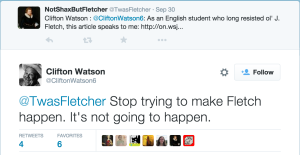 What if people talked about the playwright John Fletcher with the same reverence they reserved for his more famous collaborator? What if he was in the news on a regular basis? What if people cared about whether it was actually him in a portrait? (Fletcher’s got some really good ones, by the way).
What if people talked about the playwright John Fletcher with the same reverence they reserved for his more famous collaborator? What if he was in the news on a regular basis? What if people cared about whether it was actually him in a portrait? (Fletcher’s got some really good ones, by the way).
In order to find out, I started a small-scale experiment (taking liberty with that word “experiment”) and imagined a world in which everybody quoted J.Fletch like Billy Shakes had gone outta style…I’ve created a Twitter Bot that responds to—rewrites and then retweets, actually—tweets about Shakespeare that contain his name; tweets that invoke him as “Billy Shakes”; and tweets that invoke some of his plays.
I started this experiment on an auspicious day. It was not only Day of DH 2015, but also the date on which a story broke about a possible portrait of Shakespeare on the cover of John Gerard’s The Herball or the Generall History of Plants (1597). [NOTE: that link goes right to the cover of the edition courtesy of the BioDiversity Library, not to any news story].

My bot, @TwasFletcher, uses Yahoo Pipes to replace all references to Shakespeare with Fletcher, changes William to John, and even replaces Billy Shakes with “J. Fletch.” It also replaces some popular play titles with ones that will be less familiar to many Shakespeare fans outside of academia, and, on occasion, will replace character names in Shakespeare’s works with the names of characters in Fletcher.**
For instance, if somebody tweets about The Taming of the Shrew, my Fletcher Bot will insist on retweeting that tweet as if it were about The Tamer Tamed, Fletcher’s play that responds to Shakespeare’s with, in my reading, significantly better (if equally complicated) gender politics. It will also replace Kate’s name with Maria, the name of Fletcher’s protagonist.



In making @TwasFletcher, I relied on tutorials by
Canterbury.
So: If you’re arriving here because your tweet about Shakespeare got hijacked, why not take a second to learn something about my man Fletch? His dramatic works are available here; you can see the title page of one of his collaborations with Shakespeare, The Two Noble Kinsmen, here (and here’s a random poem).
And why not Follow @TwasFletcher for more hijinks with #ReplaceShakespeareWithFletcher…hilarity will no doubt ensue, right? (You can follow him by clicking on the button at the footer of this blog!)
If you already know me and know Fletcher, don’t worry–I won’t retweet your tweets and #ReplaceShakespeareWithFletcher forever; I’ll remove the feed that searches for Shakespeare in the feeds of my Tweeps after the conference (in about one month) and you can block @TwasFletcher if you’d like.

**One of the things I’ve noticed in my research on Shakespeare’s Folios is that the dedicatory verses in them contain almost no references to specific characters; those who packaged and helped sell his collected works pitched him as a commodity rather than the characters we all know and love. His characters did have name recognition in the period (Falstaff was the one people seem to invoke by name most often), but those who made that folio made Shakespeare himself the focus. In the Beaumont and Fletcher folio (published in 1647), by contrast, the dedicatory verses name characters with some frequency. It’s interesting, though I don’t yet know what to make of that fact.